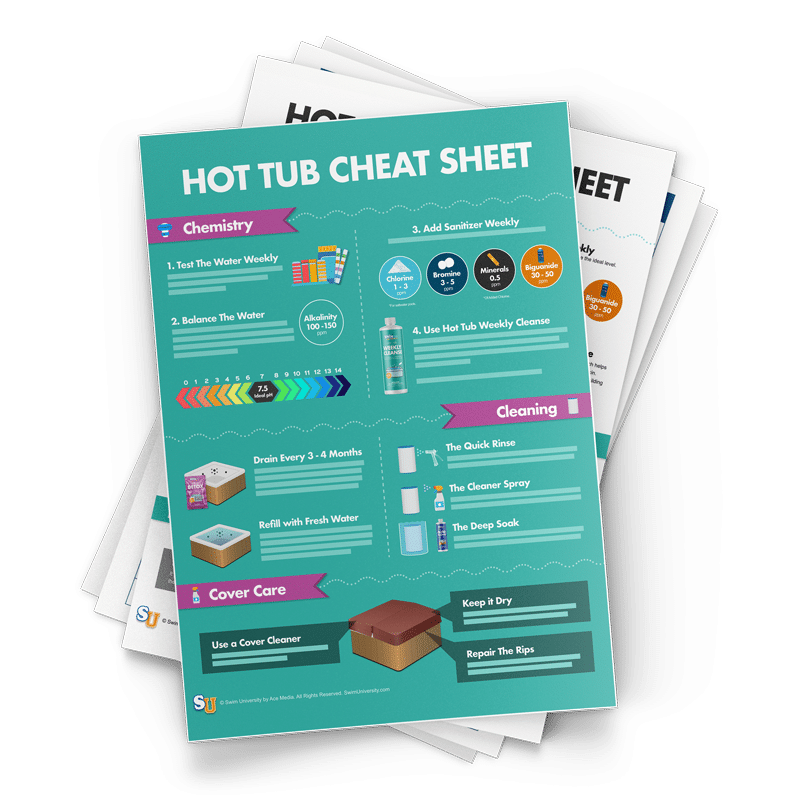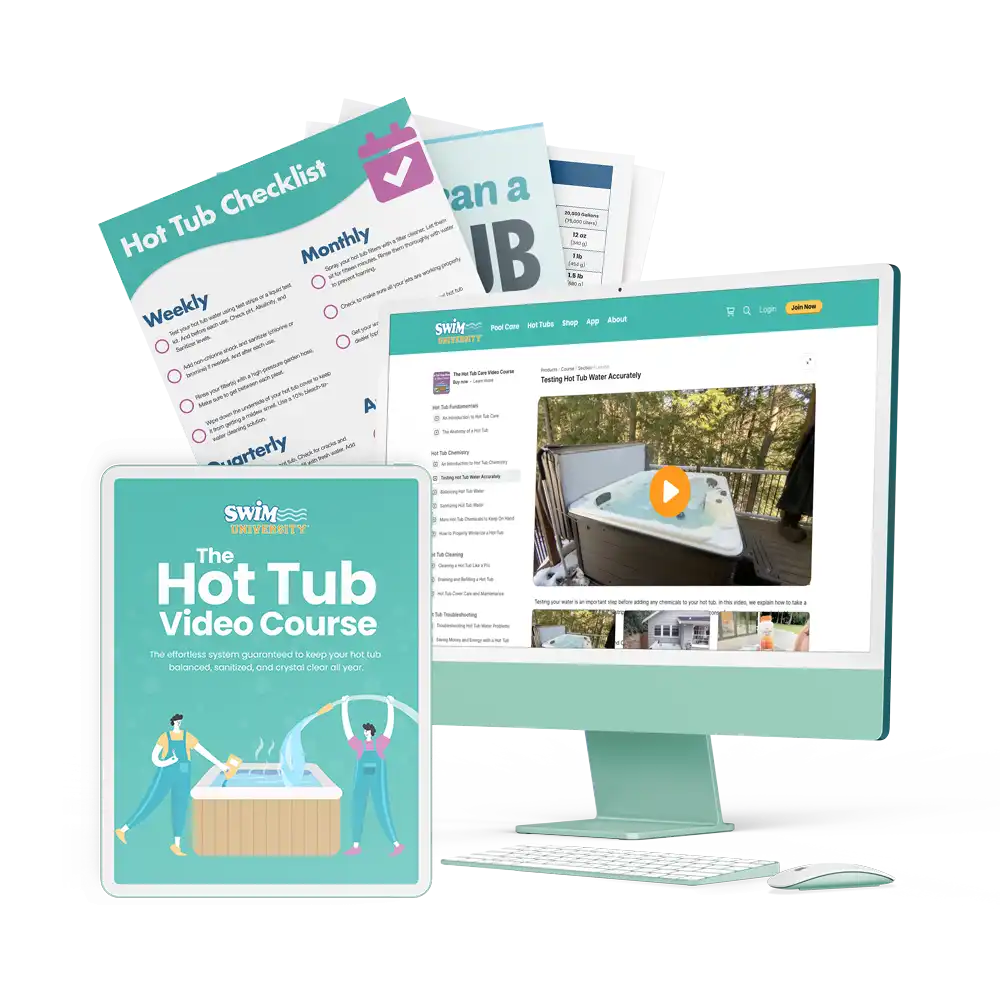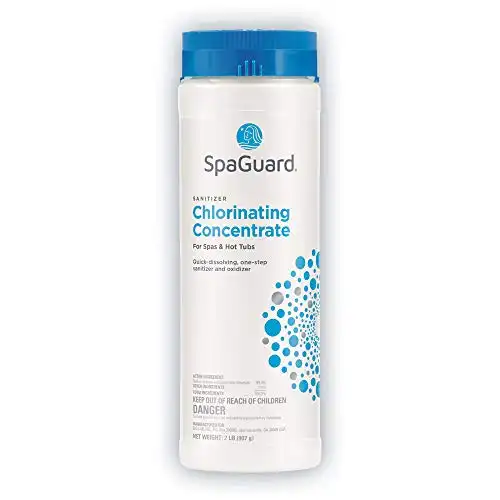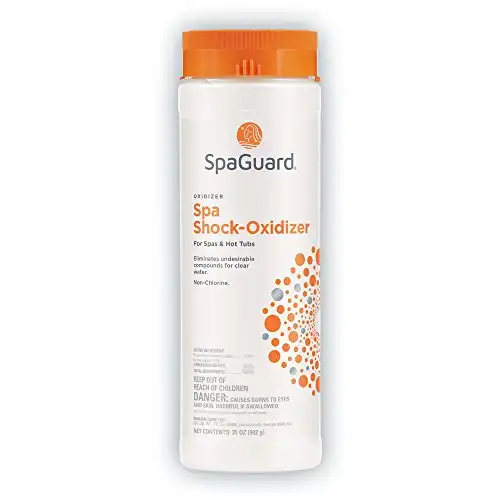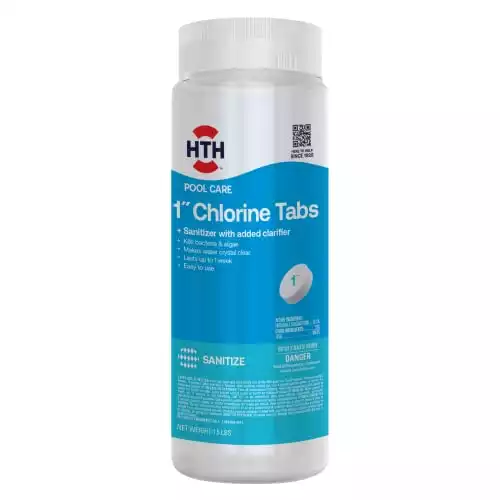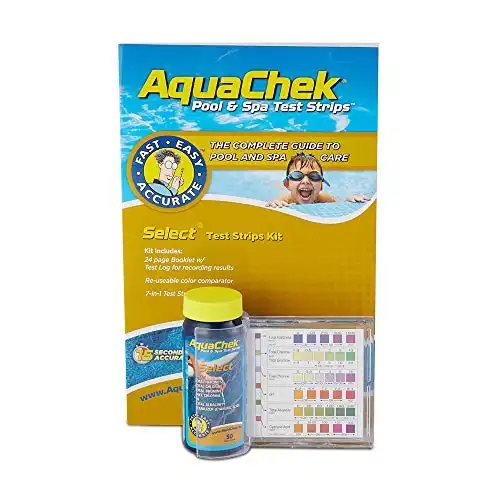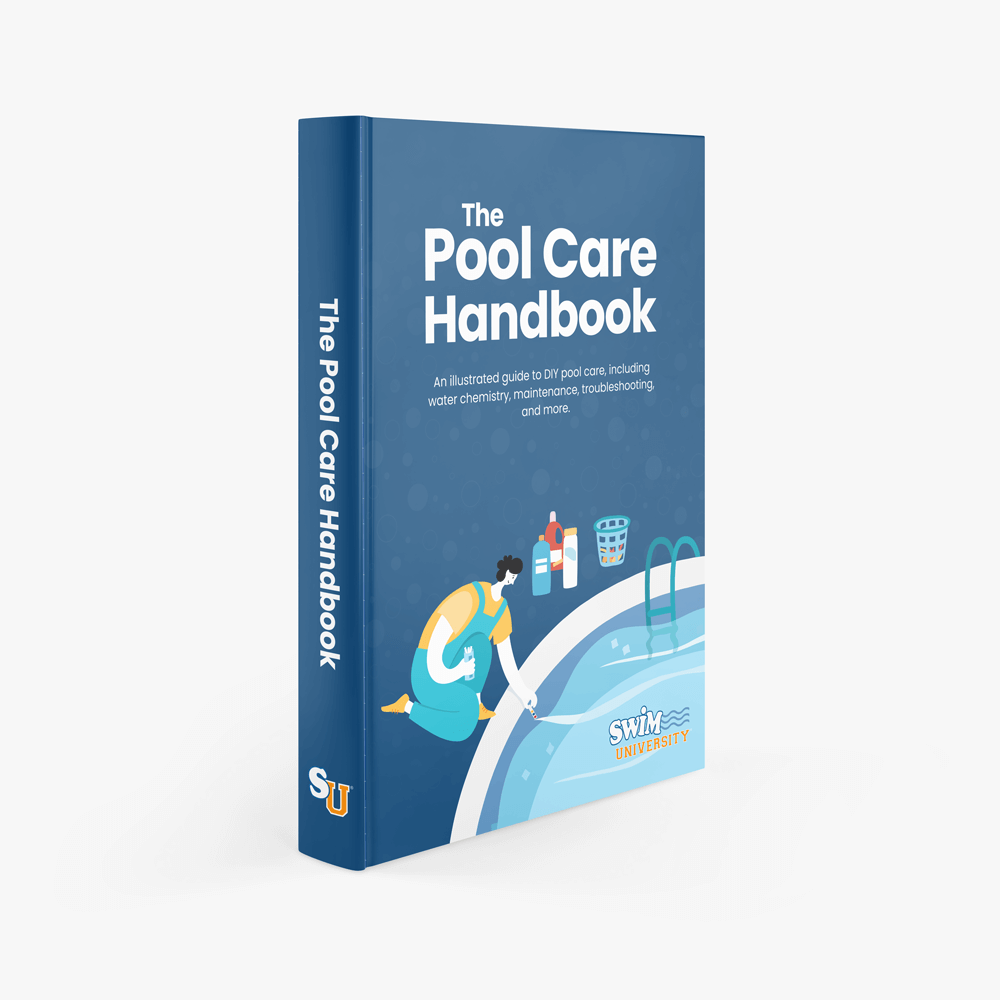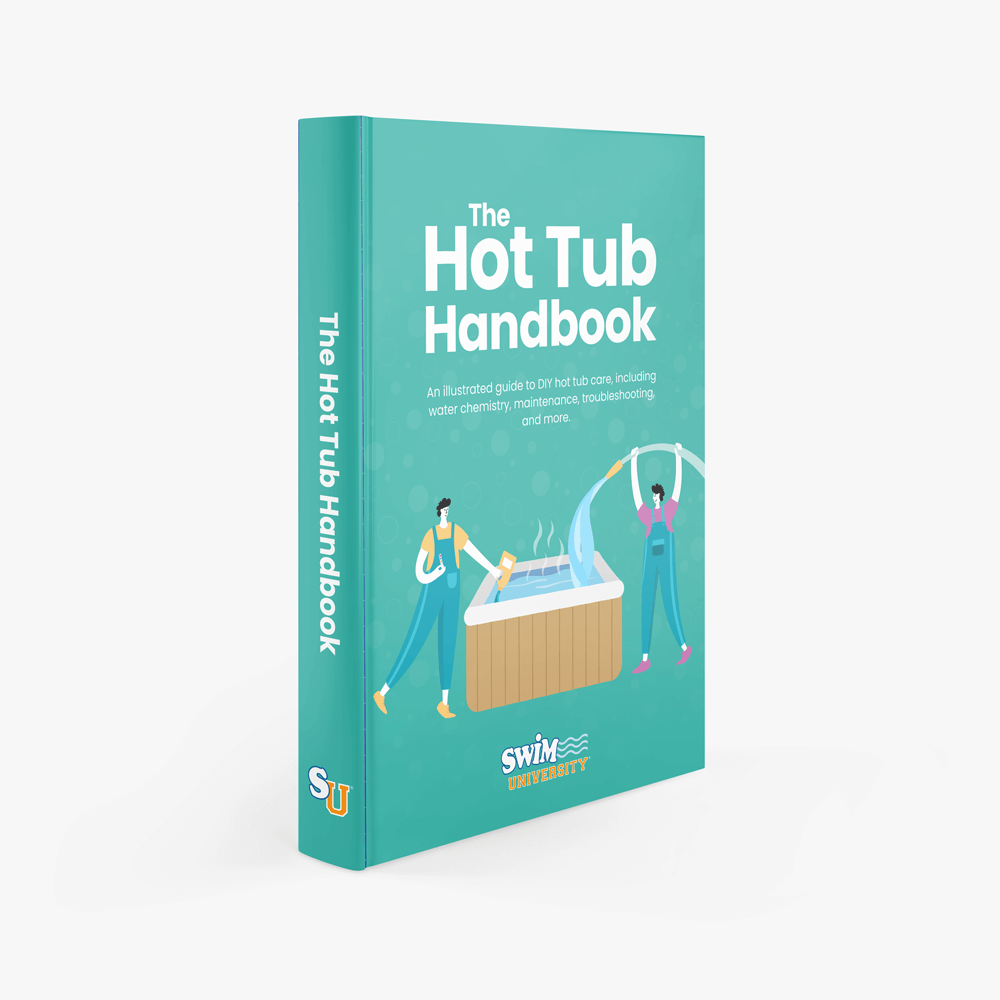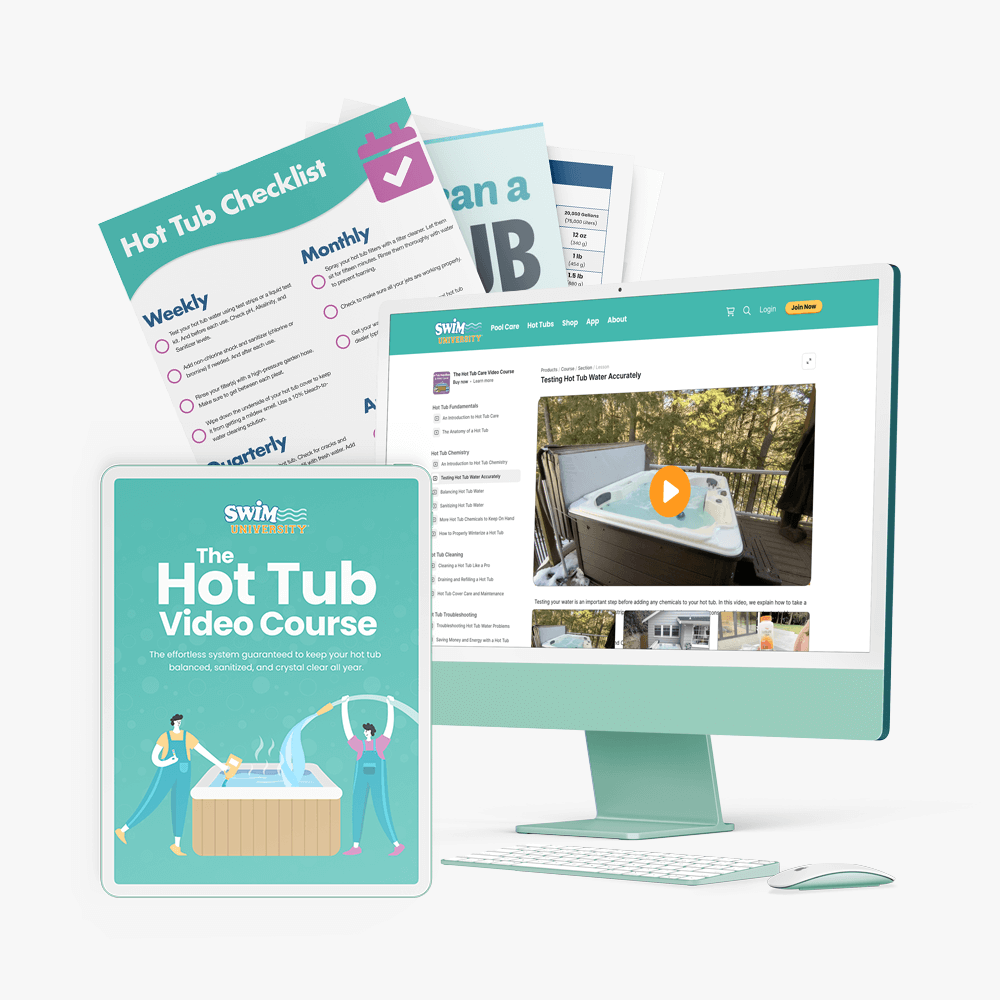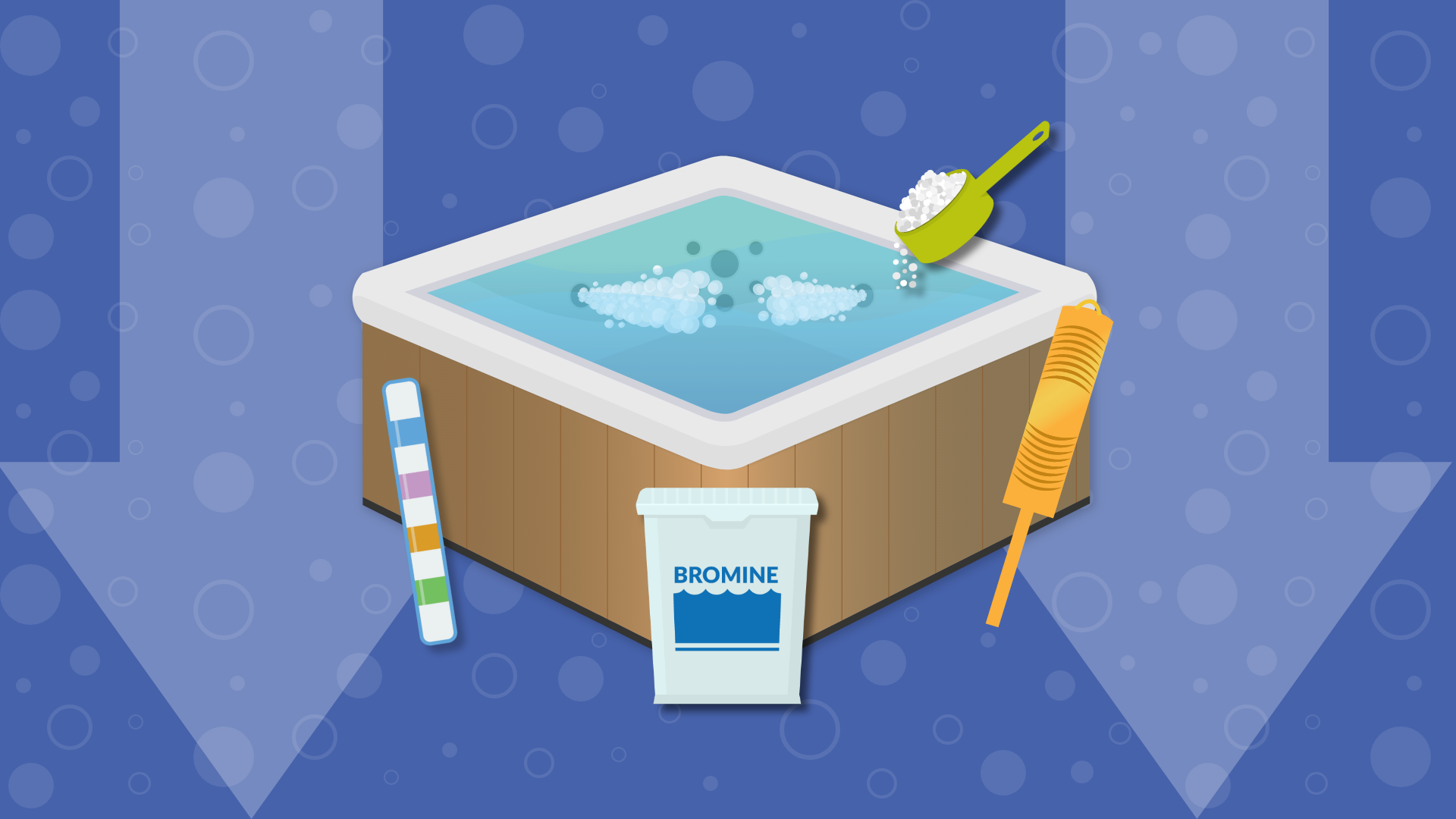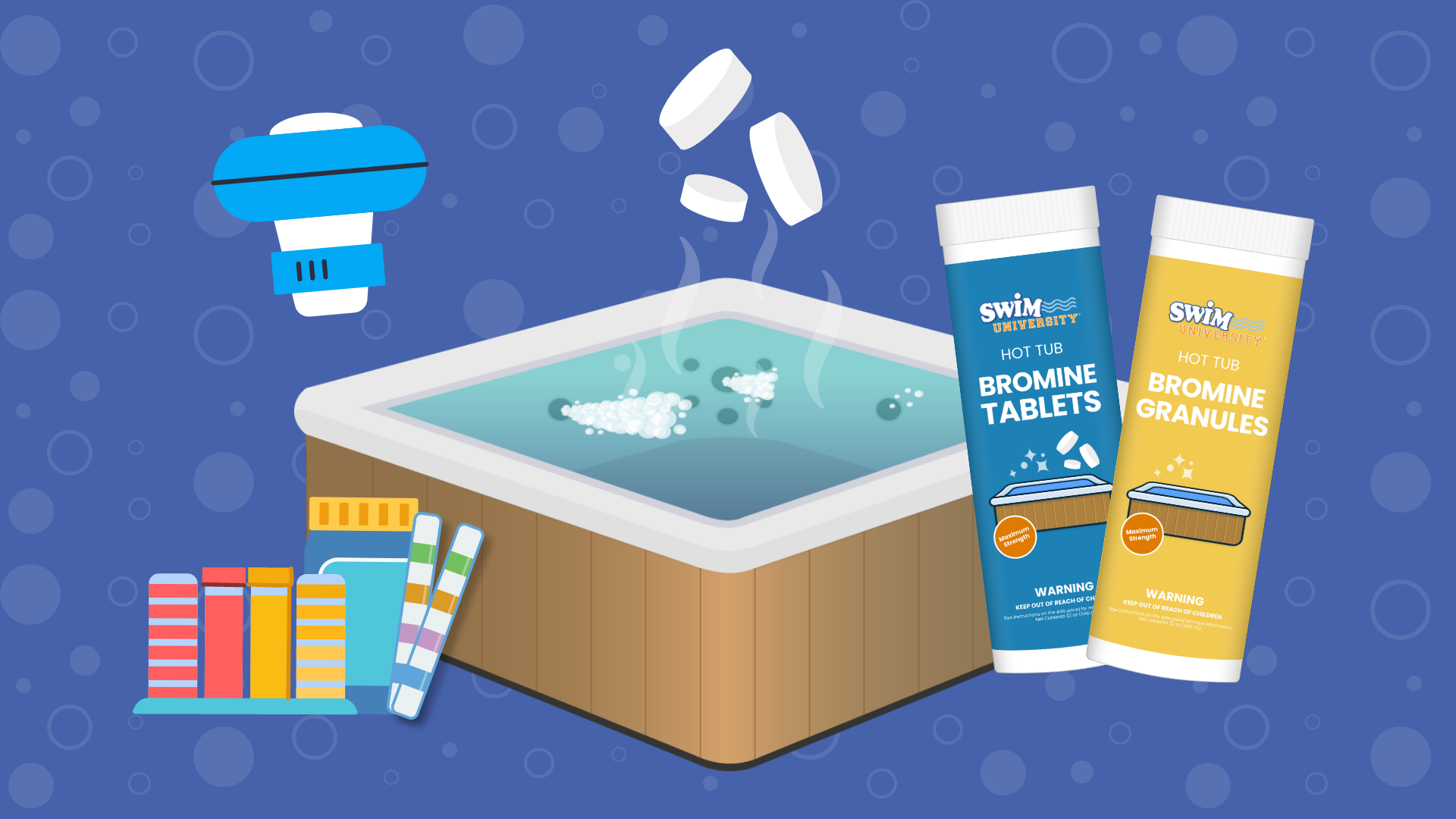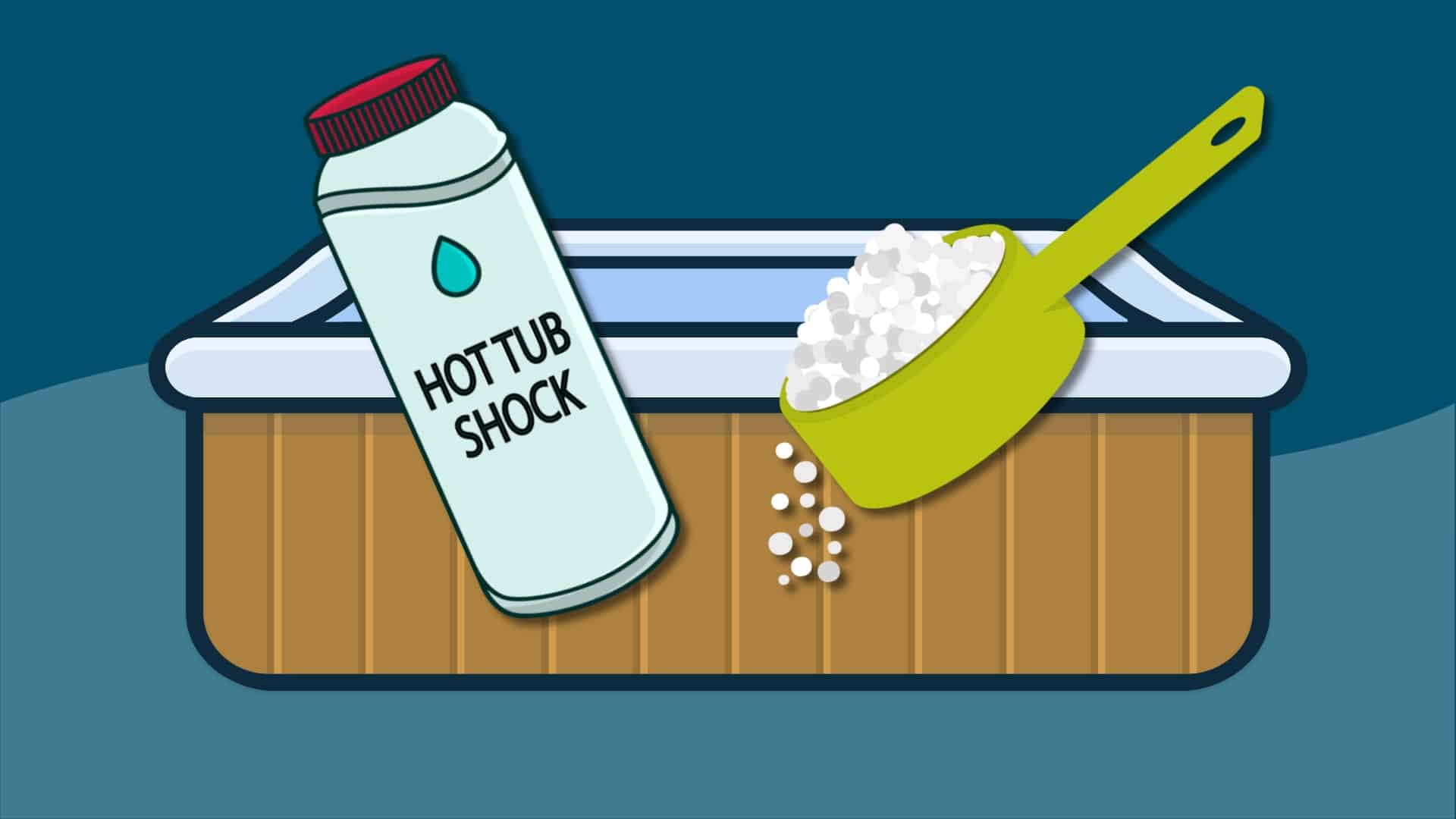How Much Chlorine to Add to Your Hot Tub
To keep your hot tub water sanitized, you’ll need to add enough chlorine to keep your chlorine levels at around 3 ppm (parts per million). But it’s easy to overdose your hot tub with too much chlorine. Knowing how much chlorine to add depends on the size of your spa and your starting chlorine levels.
My fool-proof system for keeping any hot tub clean and clear at all times. Our course covers every type of hot tub, including portable spas, inflatable hot tubs, inground hot tubs, swim spas, and more. This is the LAST and ONLY hot tub guide you'll need.
As a general rule for weekly maintenance, add 1/2 teaspoon (0.17 oz) of chlorine granules for every 100 gallons of water. That means for a 500-gallon hot tub, you’ll need to add about 2 1/2 teaspoons (0.5 oz) of chlorine granules each week.
If your chlorine level is at 0 ppm or you’re battling an issue like cloudy water, you’ll need a larger dose. Add 1 teaspoon (0.34 oz) of chlorine for every 100 gallons of water to superchlorinate your hot tub water.
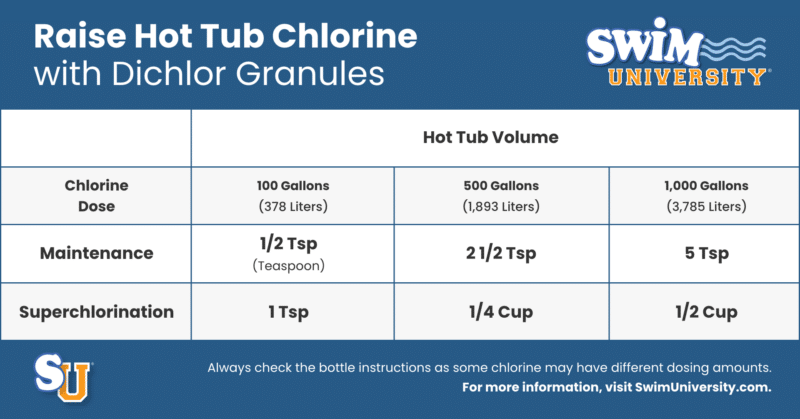
Note: These calculations are based on a concentrated formula of chlorine granules (almost 99% sodium dichlor chlorine).
How Much Chlorine Do You Need in a Hot Tub
Your hot tub chlorine levels should be around 3 ppm. Anything above 5 ppm will cause irritation and corrode your hot tub surfaces. Anything below 1 ppm will lead to unsanitary water.
Most people add chlorine granules (a.k.a. sodium dichlor chlorine) to sanitize their hot tub water, but others sanitize with slow-dissolving tablets or liquid chlorine. Regardless of what you use, plan on testing your water at least once a week and after adding chlorine to find the right dosages.
Chlorine Granules
This fast-dissolving chlorine is what I recommend adding to your hot tub. It’s added directly to your hot tub water. For maintenance, add 1/2 teaspoon (1/6 ounce) of chlorine granules for every 100 gallons of water. Adding chlorine this way is perfect for weekly maintenance and your first-time hot tub start-up.
When buying chlorine for your hot tub, look for the active ingredient sodium dichlor (this is the short name). It should contain about 99% Sodium Dichloro-s-Triazinetrione.
This granular, stabilized chlorine is fast-acting and quick-dissolving. You can add it directly to your hot tub water. Because this product contains CYA (stabilizer), it's best used in outdoor hot tubs that are exposed to UV rays.
Chlorine Shock
Chlorine shock is similar to chlorine granules. They both contain Sodium Dichloro-s-Triazinetrione (a.k.a sodium dichlor). But shock has a lower percentage than pure chlorine granules, which means it’s less powerful. And it also contains an oxidizer. This shock treatment is better for quickly killing contaminants that cause green and cloudy water.
When it comes to shocking your hot tub, I recommend using a non-chlorine shock treatment along with chlorine granules. For more information, check out our article on hot tub shock.
Also known as oxidizer, non-chlorine hot tub shock helps revitalize your chlorine or bromine so it can actively sanitize your water. Use an oxidizer at least once a week but ideally after each hot tub soak to keep your water sanitized.
Chlorine Tablets
Chlorine tablets are slow-dissolving pucks that are added to a chlorinator or floating dispenser. It’s a simple, hands-off way to keep your water consistently sanitized. One or two 1-inch chlorine tablets are usually enough to sanitize 500 gallons of water.
Just make sure that your dispenser (floater or chlorinator) is releasing the correct amount of chlorine. It’s very easy to overchlorinate the water if your setting is too high.
Personally, I don’t recommend using chlorine tablets or pucks in your hot tub with a floating. It’s much faster and just as convenient to add chlorine granules (powder).
One-inch chlorine tablets are a better option for smaller pools and hot tubs (compared to three-inch tablets). Be sure to buy a smaller chlorine dispenser and set the dosing rate appropriately.
Liquid Chlorine
Like granules, this concentrated form of chlorine is added directly to your hot tub water. You don’t need that much to keep your hot tub sanitized, so be sure to measure out the amounts before adding it.
One to two ounces of liquid chlorine is enough to sanitize 500 gallons of hot tub water. But you’ll need to test after dosing since each formula has a different concentration of chlorine.
Again, I also don’t recommend using liquid chlorine in your hot tub. Stick with chlorine granules. Here’s how to do it…
How to Add Chlorine Granules to Your Hot Tub
Before you start adding any chlorine granules, you need to know how many gallons your hot tub holds. Your hot tub’s volume or water capacity is found in your owner’s manual or by looking up the model of your hot tub online. You can also check out our guide on how many gallons your hot tub holds.
You’ll also need the right measuring tools. Because you’ll be dealing in such small quantities, it’s important to have a kitchen measuring cup, tablespoon, and teaspoon for your hot tub. As a reference:
- 1/4 cup = 2 ounces
- 1/8 cup = 1 ounce
- Tablespoon = 1/2 ounce
- Teaspoon = 1/6 or 0.17 ounce
Finally, you’ll need the right chlorine granules. Look for a superconcentrated formula (almost 99% sodium dichlor chlorine) that also comes with an oxidizing agent. That will help break up any organic compounds in the water and help activate existing chlorine in the water.
Once you have your chlorine granules and you’ve measured out how much chlorine you need, here’s how to it to your water:
1. Get Your Spa Water Ready
Keep your hot tub jets on low with the air valves off. You want your water to circulate through the filtration system, but too much air can affect your chlorine and pH levels.
Make sure your water temperature is heated to at least 85 degrees Fahrenheit (30 Celcius) to help your chemicals dissolve.
2. Test Your Hot Tub Water Chemistry
Test and balance your pH levels and total alkalinity first. These levels affect your chlorine’s ability to sanitize the water, so make sure they’re in range before adding chlorine.
- Ideal Total Alkalinity Level: 100 – 150 ppm (as low as 80 ppm is okay)
- Ideal pH Level: 7.4 – 7.6
- Ideal Calcium Hardness Level (optional): 150 – 250 ppm
If you need more help balancing your chemistry, check out our guide on Hot Tub Chemicals for Beginners. You can also check out our guides on pH and alkalinity:
- How to raise pH in a Hot Tub (and how to lower pH)
- How to Raise Alkalinity in a Hot Tub (and how to lower alkalinity)
For testing, I recommend using test strips. They’re quick and easy to use. However, they’re not as accurate as a liquid test kit. But we don’t need to be super accurate; we just need to be close enough. If you’re the kind of person who likes being precise, I recommend investing in a digital liquid test kit.
Tests for 7 important chemistries in seconds: Total Hardness, Total Chlorine, Total Bromine, Free Chlorine, pH, Total Alkalinity, and Cyanuric Acid.
3. Add Chlorine to Your Hot Tub
Add chlorine granules directly to your hot tub water. Measure out your chlorine first, then sprinkle it slowly over the entire surface of the hot tub water. This is called “broadcasting.”. Your ideal free chlorine level should be between 1-3 ppm.
If you use bromine granules, you add it the same way. Your ideal bromine level should be between 3-5 ppm. If you use chlorine tablets (or bromine), just make sure your floating chlorine or bromine dispenser has at least 1-2 tablets inside.
4. Wait and Retest The Water
Wait at least 5 to 15 minutes before retesting the water or adding other chemicals. Keep your hot tub jets running and your air valves off to help your chemicals evenly and quickly disperse.
At this point, it’s a good idea to take a sample of the hot tub water in a clean container. Let the sample cool off to room temperature before testing with a test strip. This will give you more accurate readings.
5. Allow The Chlorine Time to Kill Bacteria
Keep your cover off. You’ll want your hot tub cover removed so the chlorine can “off-gas.” And you want to wait at least 20 minutes before soaking in your hot tub after you add chlorine. Soaking in freshly chlorinated water could cause skin irritation if you have high levels.
Remember, you can always add more chlorine later. So start with a conservative dose, let the chlorine dissolve, then retest your water. You’ll get a better understanding of how much chlorine to add to your spa over time.
How Much Chlorine Should I Add to a Hot Tub Each Week?
For a weekly maintenance dose, add 1/2 teaspoon of chlorine granules for every 100 gallons of water. That means 1 1/2 teaspoons for a 300-gallon hot tub and 3 teaspoons for a 600-gallon hot tub.
Frequently Asked Questions about Hot Tub Chlorine
Need more help adding chlorine to your hot tub? We asked this question to 20,000 hot tub owners. Here are some common questions they had.
How Much Chlorine Do I Put in a 300-Gallon Hot Tub?
For a 300-gallon hot tub, add 1 1/2 teaspoon of chlorine granules once per week. If you need to superchlorinate your water because your chlorine is at 0 ppm or you have cloudy water, use around 3 teaspoons. You can always add more, so test before and after adding a conservative dose.
Can I Put Too Much Chlorine in a Hot Tub?
Yes, it’s easy to add too much chlorine to a hot tub. So if you’re unsure how much you need to add, start slowly with a conservative dose and retest your water after 20 minutes. If your chlorine levels get too high, you can lower your chlorine by letting some of the water evaporate and refilling it with fresh water. Here’s our guide on How to Lower Hot Tub Chlorine.
Should I Put the Jets On When Adding Chlorine?
When adding chemicals like chlorine, turn your hot tub jets on low and turn your air valves off. Having active movement in the water will help the chemicals dissolve faster. But you don’t want too much air, which can oxidize your chemicals and increase your pH. Turning off the air valves will prevent that from happening.
How Soon Can I Go in a Hot Tub After Adding Chlorine?
After adding chlorine, wait at least 20 minutes before using your hot tub. Make sure to retest the water before using, especially if you’ve superchlorinated the water. Your chlorine should be around 3 ppm before you use the hot tub.
Do You Need to Add Chlorine to a Salt Water Hot Tub?
No. Salt water hot tubs generate their own chlorine disinfectant (hypochlorous acid). You generally keep around 2,000 to 3,000 ppm of salt (table salt) in the water. The salty water passes through a generator which converts the salt into hypochlorous acid to sanitize the spa water. However, you may need to add a non-chlorine shock to oxidize chloramines (combined chlorine) every week.
Will Chlorine Remove Build-Up Inside My Hot Tub?
Most buildup inside your hot tub plumbing (caused by lotions, cosmetics, detergents, etc.) is resistant to chlorine. You need to use a hot tub line flush to loosen this gunk. I recommend using a set of hot tub cleaners every 3-4 months when you drain your hot tub.
3 More Ways We Can Help With Your Hot Tub
- Hot Tub Cheat Sheets (Free): Easy-to-use guides to help you keep your hot tub water balanced and sanitized.
- The Hot Tub Handbook: An illustrated guide to DIY hot tub care, including water chemistry, maintenance, troubleshooting, and more.
- The Hot Tub Care Course. You’ll get step-by-step videos and a step-by-step downloadable guide with everything you need to know about hot tub maintenance.
